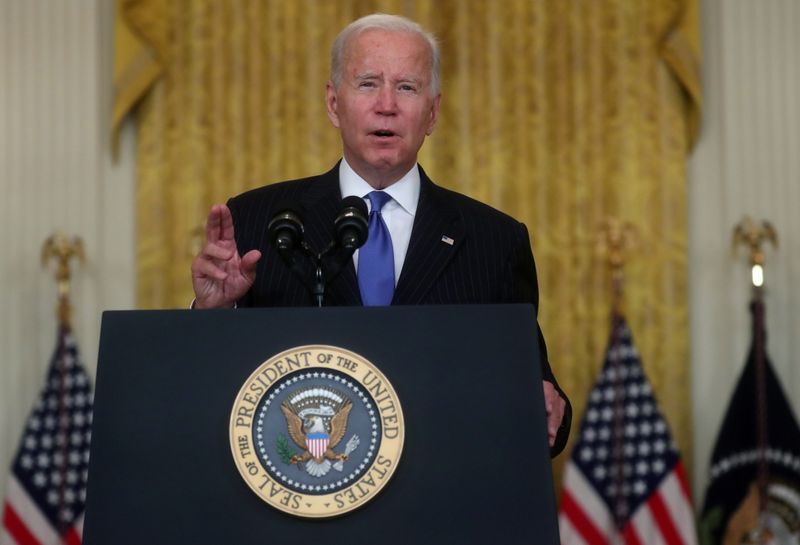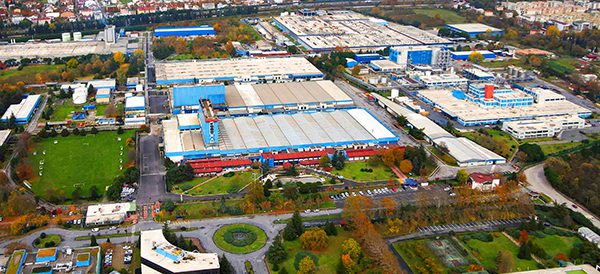
© Reuters. U.S. President Joe Biden delivers remarks about global transportation supply chain bottlenecks from the East Room at the White House in Washington, U.S., October 13, 2021. REUTERS/Leah Millis
(Refiles to add dropped word in paragraph 2)
By Nandita Bose and Tom Hals
WASHINGTON (Reuters) -Several influential industry groups including the U.S. Chamber of Commerce met White House officials on Friday and raised concerns about labor shortages and coronavirus testing requirements as the administration races to implement a plan to require private-sector workers to be vaccinated against COVID-19.
The Office of Management & Budget (OMB) conducted the meetings virtually, with some scheduled for Monday, among which will be the Retail Industry Leaders Association, the Business Roundtable and the National Association of Manufacturers, according to public filings. The industry groups requested the meetings, which are part of the rulemaking process.
Other powerful groups and companies such as the HR Policy Association, a forum for the largest U.S. employers, and automaker Chrysler parent Stellantis discussed the mandate with OMB officials on Thursday.
The HR Policy Association emphasized that businesses want to be a partner to boost vaccination rates, according to Roger King, the group’s senior labor and employment counsel.
The group did express concerns that employers need clear rules on a variety of issues, including COVID-19 testing alternatives to vaccination and confidentiality.
“It appears to be moving forward with warp speed,” King said.
Marc Freedman, vice president of workplace policy for the U.S Chamber, said the group raised concerns about labor shortages and how regulation of the Occupational Safety and Health Administration could intensify existing supply chain problems facing U.S. companies ahead of the holidays. Other topics such as testing requirements and who will bear the cost were also raised, he said.
Freedman said the Chamber hopes the Biden administration will offer a grace period to employers so they can come into compliance with the new regulation.
President Joe Biden’s plan has drawn mixed reactions from companies and industry trade groups.
Several big employers such as Procter & Gamble (NYSE:PG) and 3M, along with airlines such as American and JetBlue, have imposed mandates since Biden’s announcement. Others such as IBM (NYSE:IBM) have said they will require all U.S. employees to be fully vaccinated by Dec. 8, regardless how often they come into the office.
Some other large U.S. employers such as Walmart (NYSE:WMT), have yet to issue broad requirements.
The retail industry, which supports over 50 million U.S. jobs, wants the administration to address questions regarding vaccination verification processes and what actions can be taken when employees refuse vaccinations and testing, according to a letter sent by RILA to the U.S. Labor Department.
Biden on Thursday said the mandate ruling can be expected “soon.” The Labor Department on Tuesday submitted https://reut.rs/3FSOqzN to the White House the initial text of the ruling.
The mandate will apply to businesses with 100 or more employees and be implemented under a federal rule-making mechanism known as an emergency temporary standard. It would affect roughly 80 million workers nationwide.
Along with Biden’s order last month that requires all federal workers and contractors to be vaccinated, the orders cover 100 million people, or about two-thirds of the U.S. workforce.
Biden’s mandate announcement in September came as the country was facing a surge in COVID-19 hospitalizations and deaths driven by the fast-spreading Delta variant of the coronavirus as a large swath of Americans refused vaccinations. The coronavirus has killed more than 700,000 Americans.
The vaccine order has already spurred pushback from many Republican governors, including Greg Abbott of Texas, who issued an executive order banning businesses in his state from requiring vaccinations for employees.
Source: Investing.com





























